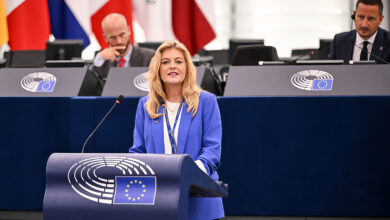The case against
 Sinn Féin Vice President Mary Lou McDonald outlines why the Lisbon Treaty isn’t the answer.
Sinn Féin Vice President Mary Lou McDonald outlines why the Lisbon Treaty isn’t the answer.
Last June Irish voters rejected the Lisbon Treaty. 52 per cent of those who voted opted for a better deal for Ireland and the European Union.
They were the third electorate to overwhelmingly reject this set of proposals. In 2005 voters in France and the Netherlands, two of the EU’s founding members, said no to Lisbon.
While in those countries the political establishment found a way to ignore the democratic will of the people and ratify the treaty without popular consent, the Irish Government had to accept the will of the people or rerun the referendum.
Despite protestations to the contrary, the Fianna Fáil-Green Party Government, actively supported by Fine Gael and Labour, have chosen to ignore the people’s will and put the same treaty before voters on October 2 of this year.
The Government has argued that an agreement signed by the 27 heads of government and state at the European Council meeting in June has addressed the concerns of many of those who voted against the treaty.
An international agreement on neutrality, taxation and ethical issues is to be lodged at the United Nations if the Lisbon Treaty is ratified by all member states. The European Council also promises that a protocol on these issues will be attached to a future accession treaty, for a country and on a date yet to be decided. The heads of state and government also agreed a Solemn Declaration on Workers’ Rights.
But have we any changes to the text of the Lisbon Treaty itself? Will any aspect of the treaty’s implementation in Ireland or across the EU be altered? Have the substantial concerns of the electorate on issues such as Ireland’s loss of influence, militarisation and neutrality, workers’ rights and public services, international trade deals, nuclear power and the developing world been addressed?
The straight answer to all of these questions is ‘no’.
The decision of the heads of state is nothing more than a series of clarifications of some aspects of the Lisbon Treaty.
It does not alter the text in any way. Nor does it change the impact that the treaty will have on Ireland.
So, when people vote on October 2 they will be voting on exactly the same treaty, with exactly the same consequences for Ireland and the EU, as they did in June 2008.
But will these guarantees not safeguard Irish neutrality and tax sovereignty? Does the solemn declaration not signal the EU’s intent on protecting workers’ rights?
Again, the answer to these questions is no. Like the emperor parading naked in public, the Lisbon Treaty has no new clothes, yet the courtiers and Ministers marvel aloud at its non-existent new apparel.
On neutrality, the decision of heads of state agreed last Friday in Brussels says: “The Lisbon Treaty does not affect or prejudice Ireland’s traditional policy of military neutrality.” This tells us Irish troops can only be sent abroad with consent of the Irish Government in the Council of Ministers and the Oireachtas.
Sinn Féin never disputed this fact. The Lisbon Treaty is very clear in this regard. But neutrality is not only what you do with your troops; it is also about alliances you form, what you do with your resources, and what other member states do in your name.
The Lisbon Treaty makes clear its intent when it states that there shall be a common defence.
In expanding the scope of permissible military missions, it demonstrates the desire to move beyond peacekeeping and civil reconstruction. In reasserting the compatibility of EU foreign and defence policies with those of NATO, it reminds that the emerging EU common defence is clearly aligned. Provisions for permanent structured co-operation create the real possibility that wars we do not support will be fought in our name and with our resources. The mutual defence clause creates obligations incompatible with any internationally recognised definition of neutrality.
On taxation, again, the Council decision tells us nothing new. Under the Lisbon Treaty, any move to a common corporation tax system across the EU would require a unanimous vote at the Council of Ministers. Anyone who read the treaty could tell you this.
Sinn Féin’s concern on taxation rests with Article 48 of the treaty. This article allows the Council of Ministers, by unanimous decision, to alter the text of existing EU treaties. Today, if the EU wanted to agree a common corporation tax system, they would have to do so as part of broader treaty revision. This would require both unanimity at Council and ratification in each member state, and a referendum in the Republic.
However, Article 48 allows the Council of Ministers to make changes to the treaties with unanimity, but without recourse to what some see as a cumbersome – read democratic – process of negotiation and ratification. So Lisbon does not affect our tax sovereignty but it makes it easier for the Council of Ministers to make the change in future, and without the inconvenience of a referendum.
Fine Gael and Labour are on record as backing some form of corporate tax harmonisation. Fianna Fáil, despite assurances, cannot be trusted on this or indeed any matter of importance.
Finally, with respect to workers’ rights and public services, the very fact that this issue is being treated differently, in the form of a non-legally binding declaration, demonstrates that despite the solemn words, there is neither the political will nor the intention to alter the current direction of EU policy and European Court of Justice decisions in this regard.
To put it another way, the Solemn Declaration on Workers’ Rights is more like an election promise by a Fianna Fáil or Fine Gael politician the week before polling day, laced with false sincerity and destined to be forgotten the moment the ballot boxes were closed.
There are also a range of issues EU leaders chose to ignore. No mention of the reduced influence of smaller member states as a consequence of the new voting arrangements at Council. No mention of the 60 or so member state vetoes that will end. No mention of the controversial changes to international trade talks opposed by farmers and trade justice groups alike. No mention of the opening up of vital public services such as health and education to the vagaries of the market.
But we secured a permanent Irish Commissioner, the Government will insist. Again, not true. The agreement here by the Council of Ministers is more like a stay of execution, promising a Commissioner for an unspecified time. Unless this issue is written into an EU treaty, the likely outcome is that the reduction in size of the Commission envisioned in Lisbon will be delayed by five years until the next European parliamentary elections in 2014.
When the Lisbon Treaty was rejected in June of last year, Sinn Féin presented the Taoiseach Brian Cowen with a detailed series of proposals for a new treaty1. These proposals would not only meet the many concerns of Irish voters, but also put the European Union on a more social, a more democratic and a more peaceful path.
At a time when Ireland and the EU are facing the worst economic crisis in decades, we need new approaches to meet the very serious challenges facing us. The Lisbon Treaty is part of the failed right-wing policy consensus that caused the recession. If we are to find a successful route to social and economic recovery we need a new treaty for new times.





